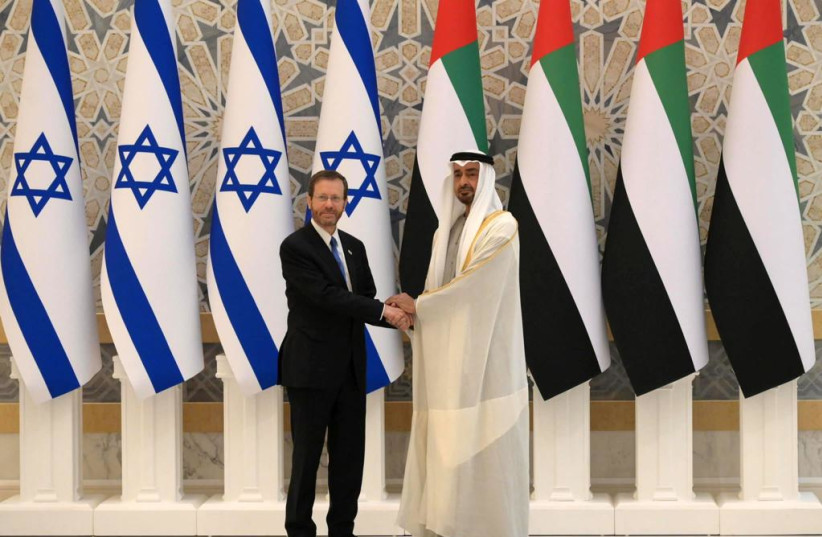President Isaac Herzog’s visit to Dubai on Monday went exactly as planned. He opened Israel’s national day at Expo 2020 with an honor guard, and “Hatikvah” played in the expo’s central plaza.
Herzog met with Sheikh Mohammed bin Rashid Al Maktoum, who is the ruler of the Emirate of Dubai and vice president and prime minister of the United Arab Emirates. Nothing changed, publicly, even though Yemen’s Houthi rebels fired a missile at the UAE earlier in the day.
After the attack, Herzog’s spokesman released a succinct statement that said the president “was updated with the details of the event. No danger was or is expected to the president and his entourage. The visit is expected to continue as planned.”
Herzog did not mention Iran or the Houthis in his subsequent remarks, but his business-as-usual attitude and continuation of the visit are clear signs that Israel is standing with its Gulf allies facing attacks from the Houthis.
The Iran-backed militia’s strike was one in a series on Dubai and Abu Dhabi in recent weeks, plus the Houthis threatened to continue attacking. None of that deterred Herzog from visiting, and the Emiratis appreciated the show of solidarity.
The UAE’s leader, Crown Prince of Abu Dhabi Sheikh Mohammed bin Zayed, known as MBZ, publicly thanked Herzog for speaking out against the terrorist attacks. “It is a stance that demonstrates our common view of the threats to regional stability and peace, particularly those posed by militias and terrorist forces, as well as our shared understanding of the importance of taking a firm stance against them,” MBZ said.
Herzog emphasized that Israel “completely support[s] your security requirements, and we condemn in all forms and language any attack on your sovereignty by terrorist groups. We are here together to find ways and means to bring full security to people who seek peace in our region.”
Several other Israeli officials spoke out against the Houthi attacks in recent weeks. Prime Minister Naftali Bennett spoke with MBZ and sent him a letter, relaying condolences and offering help in the areas of security and intelligence.
“Israel is committed to working closely with you in the ongoing battle against extremist forces in the region and we will continue to partner with you to defeat our common enemies,” Bennett wrote. “We stand ready to offer you security and intelligence support in order to help you protect your citizens from similar attacks.”
Foreign Minister Yair Lapid called on the international community to strongly condemn the attacks and take immediate measures so that Iran and its proxies will no longer be able to attack innocent people and undermine regional stability.
Transportation Minister Merav Michaeli and Deputy Minister Abir Kara released statements condemning the attack as well. Knesset Foreign Affairs and Defense Subcommittee for Strategy and Policy Zvi Hauser called on the government to designate the Houthis as a terrorist organization and to encourage the US to reverse its decision to remove the Houthis from its list of foreign terrorist groups.
The opposition joined in, with Likud MK and former intelligence minister Eli Cohen saying, “The State of Israel stands with the Emirati people. Terror will not deter us... The Houthis’ attack proves the importance of the diplomatic and security alliance created by the Abraham Accords against Islamist extremists and Iran’s terror metastases.”
UAE Ambassador to Israel Mohamed Al Khaja expressed appreciation for the statements, tweeting, “We are humbled by your sincere support.”
The Emiratis don’t like to present their normalization with Israel, announced in August 2020, as being primarily a defense relationship. There are plenty of other areas of cooperation, such as trade, tourism, science and health.
But the fact that both countries are in Iran’s crosshairs brought them – and other Gulf states – together in recent years and played a key part in building the relationship that turned into the Abraham Accords.
Israel is showing that it stands with the UAE on that front in subtle and obvious ways.
Herzog’s business as usual in Dubai after Houthi attack shows solidarity - analysis
President Isaac Herzog’s visit to Dubai on Monday went exactly as planned.

